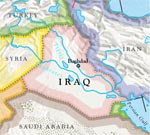Iraqi powers back government crackdown, demand end to militias
 Baghdad - Iraq's political blocs backed a government crackdown on Shiite militias and a demand by the country's political council for parties to disband their militias as a condition for participation in a key local election, an Iraqi lawmaker said Sunday.
Baghdad - Iraq's political blocs backed a government crackdown on Shiite militias and a demand by the country's political council for parties to disband their militias as a condition for participation in a key local election, an Iraqi lawmaker said Sunday.
In a meeting on Saturday evening, Iraq's political council of national security gave its backing to a government offensive against Shiite militants in oil-rich southern Basra province and other areas, MP Fouad Masum said.
The council representing the country's sectarian, ethnic and political groups is made up of the Kurdish president, his two Sunni and Shiite vice-presidents, a Shiite premier and leaders of major political blocs.
The council endorsed a statement supporting the crackdown in Basra and other provinces and urged all political parties to disband their militias as a condition for participation in the political process, Masum told the Voices of Iraq (VOI) news agency.
"All political parties and blocs are urged to immediately disband their militias and hand in their arms to the state and switch to peaceful civilian activities as a condition to participation in the political process and election," the council said in a statement.
Only the Sadrist bloc of Shiite cleric Moqtada al-Sadr objected to the council's support for the government offensive and its call for disbanding militias, said Masum from the Kurdish Alliance bloc.
Al-Sadr's Mahdi Army militia was the main target of the offensive that was launched on March 25 in Basra, which left hundreds dead and injured.
Al-Sadr called his fighters off the streets last Sunday, which prompted the government to halt its operations. But it vowed to continue a campaign against outlaws and armed groups threatening law and order.
The radical cleric, who is believed to be currently in Iran, accuses the government of launching the offensive ahead of crucial provincial elections in October.
Al-Sadr bloc has a big following among the country's poor and destitute Shiite Muslims, especially in the south and parts of Baghdad.
Shiite blocs, including al-Maliki's Islamic Dawa party, are gearing up for the elections and may fear al-Sadr's growing popularity.
The crackdown is a way of weakening Sadrists' grip over their strongholds in the south and areas in east Baghdad.
Al-Sadr is opposed to federalism backed by his rivals in the powerful Shiite Supreme Islamic Iraqi Council (SIIC). Any election victory by the Sadrists in October would mean an end to SIIC's hopes to establish an autonomous region in the south, styled after the Kurdish Autonomous Region in northern Iraq. (dpa)